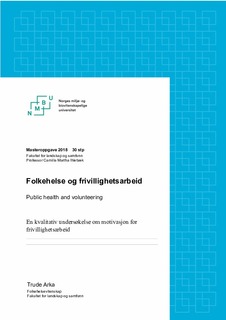| dc.contributor.advisor | Ihlebæk, Camilla Martha | |
| dc.contributor.advisor | Jeanine, Brenna | |
| dc.contributor.author | Arka, Trude | |
| dc.coverage.spatial | Norway, Oslo | nb_NO |
| dc.date.accessioned | 2018-10-29T09:45:36Z | |
| dc.date.available | 2018-10-29T09:45:36Z | |
| dc.date.issued | 2018 | |
| dc.identifier.uri | http://hdl.handle.net/11250/2569898 | |
| dc.description.abstract | Bakgrunn: I møte med fremtidens utfordringer innen folkehelse- og velferdsfeltet trekkes ofte frivillig sektor frem som en del av løsningen. Deltagelse i frivillig arbeid er også viktig for å fremme deltakelse og sosial inkludering for enkeltmennesker. Men bare 10 % av frivilligheten foregår i helse og velferdssektoren, og det trengs mer kunnskap om motivasjon til de som velger å jobbe frivillig i denne sektoren.
Mål: Formålet med denne studien er å undersøke hva som motiverer frivillige til å bruke av sin tid på frivillighetsarbeid innenfor helse- og omsorgssektoren, og å undersøke hvordan de opplever det å jobbe der.
Metode: Semi-strukturerte dybdeintervju av 15 frivillige ved kafeen Møtestedet, som drives av Kirkens Bymisjon. Møtestedet er en kafe med en sosialfaglig profil for mennesker i rus- og gatemiljøet i Oslo. Informantene ble rekruttert internt gjennom forespørsel fra ledelsen ved Møtestedet. Data ble analysert ved hjelp av Malteruds systematiske tekstkondensering. Selvbestemmelsesteorien til Deci og Ryan (1985) ble benyttet som teoretisk rammeverk for studien.
Resultat: Analysen ble delt inn i startmotivasjon, opprettholdt motivasjon og opplevd arbeidsmiljø. Informantene hadde ofte sammensatt motivasjon for å starte ved Møtestedet, og hovedkategoriene som ble identifisert var et ønske om å hjelpe andre, å oppleve selvutvikling eller selvhjelp, og noen oppgav også en strategisk motivasjon. Det å hjelpe andre og selvutvikling var også hovedkategorier som kom frem under opprettholdende motivasjon, og i tillegg snakket informantene om variasjon fra hverdagen og sosialt felleskap som motivasjons-grunner. Informantene opplevde arbeidsmiljøet på Møtestedet som veldig godt, og hovedkategorier som kom frem gjennom tekstanalysen var innflytelse, mestring, inklusjon, og tilhørighet.
Konklusjon: Funnene i studien viste at informantenes motivasjon for å starte som frivillig var mer preget av ytre regulering og kontrollert motivasjon, mens den opprettholdende motivasjonen hadde beveget seg gjennom en internaliseringsprosess til å bli mer integrert og autonom over tid. Informantene beskrev et autonomistøttende arbeidsmiljø, der de opplevde å få tilfredsstilt grunnleggende psykologiske behov, og dette kan bidra til å forklare hvordan motivasjonen hadde endret seg. | nb_NO |
| dc.description.abstract | Background: When addressing future challenges in the field of public health and welfare, the voluntary sector is often cited as part of the solution. Furthermore, participation in voluntary work is considered significant for promoting participation and social inclusion on an individual level. However, a mere 10 percent of voluntary work takes place in the health- and welfare sector, and more insight into motivation to volunteer in this sector is in demand.
Goal: The purpose of this study is to investigate what motivates volunteers to spend their time volunteering with one specific initiative within the health- and care sector, and to investigate how they experience working there.
Method: The study utilises semi-structured in-depth interviews with 15 volunteers at the café Møtestedet [The Meeting Place] run by Kirkens Bymisjon [The Church City Mission].
Møtestedet is a café with a socially oriented profile for people in marginalised life situations in Oslo. The informants were recruited internally on the request of Møtestedet’s administration. Data is analysed using Malterud’s systematic text condensation. Deci & Ryan’s (1985) Selfdetermination theory is utilised as the study’s theoretical framework.
Results: The analysis is divided into Motivation to Start, Sustained Motivation and Perceived Work Environment. Typically, the informants have composite motivations for starting to volunteer at Møtestedet. The main categories identified are wishing to help others and to experience self-development or self-help, with some reports of strategic motivation. Wishing to help others and self-development are also main categories for sustained motivation. In addition, informants speak of a break from everyday life and a sense of community as explanations for sustained motivation. The informants describe the work environment at Møtestedet as very good, and main categories emerging from text analyses are the ability to influence, a sense of mastery, inclusion and belonging”.
Conclusion: The study’s findings indicate that the informants’ motivations for starting to volunteer are characterised by external regulation and controlled motivation. However, their sustained motivations have moved through an internalization process and become more integrated and autonomous with time. The informants describe an autonomy-supporting work environment, where they experience having basic psychological needs met, a fact contributing to the explanation of how their motivations have changed. | nb_NO |
| dc.language.iso | nob | nb_NO |
| dc.publisher | Norwegian University of Life Sciences, Ås | nb_NO |
| dc.rights | Attribution-NonCommercial-NoDerivatives 4.0 Internasjonal | * |
| dc.rights.uri | http://creativecommons.org/licenses/by-nc-nd/4.0/deed.no | * |
| dc.subject | Volunteering | nb_NO |
| dc.subject | Voluntary work | nb_NO |
| dc.subject | Motivation | nb_NO |
| dc.title | Folkehelse og frivillighetsarbeid | nb_NO |
| dc.title.alternative | Public health and volunteering | nb_NO |
| dc.type | Master thesis | nb_NO |
| dc.description.version | submittedVersion | nb_NO |
| dc.description.localcode | M-FOL | nb_NO |

